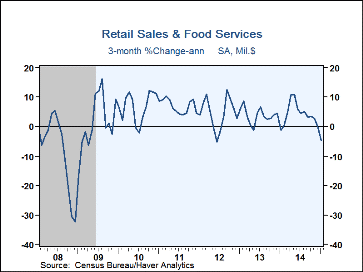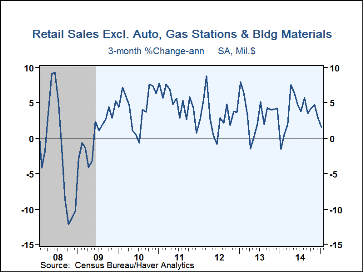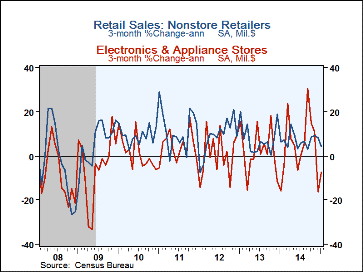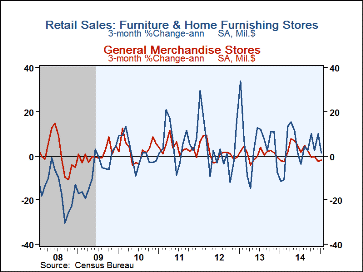 Global| Feb 12 2015
Global| Feb 12 2015U.S. Retail Sales Are Disappointing
by:Tom Moeller
|in:Economy in Brief
Summary
Overall retail sales including food services & drinking places declined 0.8% last month following an unrevised 0.9% fall in December. A 0.5% shortfall had been expected in the Action Economics Forecast Survey. Sales excluding autos [...]
Overall retail sales including food services & drinking places declined 0.8% last month following an unrevised 0.9% fall in December. A 0.5% shortfall had been expected in the Action Economics Forecast Survey. Sales excluding autos slumped 0.9% (+1.6% y/y) for a second month. A 0.5% shortfall had been expected. During the last ten years, there has been a 58% correlation between the y/y change in retail sales and the change in disposable personal income. Sales in the retail control group, which exclude autos, gasoline, building materials and food services and align with the estimates in the GDP accounts, ticked 0.1% higher (4.3% y/y) after a 0.3% decline.
Lower gasoline prices continued to pull the value of retail sales lower with a 9.3% drop (-23.5% y/y), the eighth straight month of decline. Another retreat in auto sales also pulled the total down as they fell 0.5% (+10.0% y/y) following a 0.8% shortfall. These declines coincide with roughly 1.5% deteriorations in unit sales in each of the last two months. Sales of building materials recovered 0.6% (6.9% y/y) following a 0.7% drop.
Sales of nonstore retailers remained strong, posting a 0.5% increase (8.3% y/y). Purchases at electronics & appliance stores improved 0.3% (+3.6% y/y) after three straight months of decline. Sales at furniture & home furnishings outlets, however, were off 0.2% (+4.5% y/y), the fourth straight month of slight decline. Apparel store sales fell 0.8% (+2.7% y/y) after a 1.2% drop and general merchandise store sales ticked up 0.1% (1.8% y/y) after a 0.9% decline. Sporting goods, hobby, book & music store sales fell 2.6% (+8.0% y/y), off for the third straight month. Remaining strong were food service and drinking place sales which increased 0.8% (11.3% y/y) after a 1.4% rise.
In the nondiscretionary sales categories, health & personal care store sales grew 0.2% (6.6% y/y) after a 0.5% rise. Food & beverage store sales declined 0.3% (+3.1% y/y), the first decline in six months.
The retail sales figures are available in Haver's USECON database. The Action Economics figures are in the AS1REPNA database.
| Retail Spending (%) | Jan | Dec | Nov | Jan Y/Y | 2014 | 2013 | 2012 |
|---|---|---|---|---|---|---|---|
| Total Retail Sales & Food Services | -0.8 | -0.9 | 0.4 | 3.3 | 4.0 | 4.2 | 5.1 |
| Excluding Autos | -0.9 | -0.9 | 0.2 | 1.7 | 3.0 | 3.0 | 4.0 |
| Non-Auto Less Gasoline, Building Supplies & Food Services | 0.1 | -0.3 | 0.6 | 4.3 | 3.3 | 3.3 | 3.6 |
| Retail Sales | -1.0 | -1.1 | 0.4 | 2.4 | 3.8 | 4.3 | 5.0 |
| Motor Vehicle & Parts | -0.5 | -0.8 | 1.4 | 10.0 | 8.2 | 9.3 | 9.1 |
| Retail Less Autos | -1.1 | -1.2 | 0.1 | 0.3 | 2.5 | 3.0 | 4.0 |
| Gasoline Stations | -9.3 | -7.4 | -3.2 | -23.5 | -3.0 | -0.3 | 4.2 |
| Food Service & Drinking Places Sales | 0.8 | 1.4 | 0.7 | 11.3 | 5.8 | 3.0 | 5.9 |
Tom Moeller
AuthorMore in Author Profile »Prior to joining Haver Analytics in 2000, Mr. Moeller worked as the Economist at Chancellor Capital Management from 1985 to 1999. There, he developed comprehensive economic forecasts and interpreted economic data for equity and fixed income portfolio managers. Also at Chancellor, Mr. Moeller worked as an equity analyst and was responsible for researching and rating companies in the economically sensitive automobile and housing industries for investment in Chancellor’s equity portfolio. Prior to joining Chancellor, Mr. Moeller was an Economist at Citibank from 1979 to 1984. He also analyzed pricing behavior in the metals industry for the Council on Wage and Price Stability in Washington, D.C. In 1999, Mr. Moeller received the award for most accurate forecast from the Forecasters' Club of New York. From 1990 to 1992 he was President of the New York Association for Business Economists. Mr. Moeller earned an M.B.A. in Finance from Fordham University, where he graduated in 1987. He holds a Bachelor of Arts in Economics from George Washington University.
More Economy in Brief
 Global| Feb 05 2026
Global| Feb 05 2026Charts of the Week: Balanced Policy, Resilient Data and AI Narratives
by:Andrew Cates










